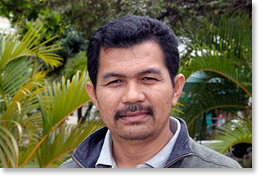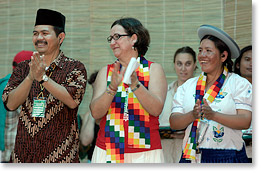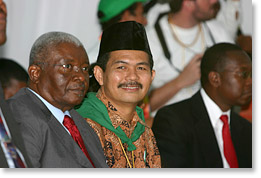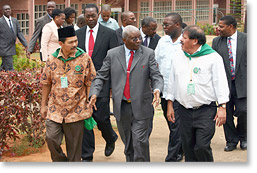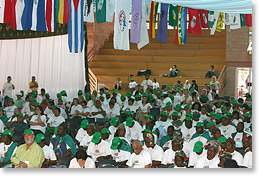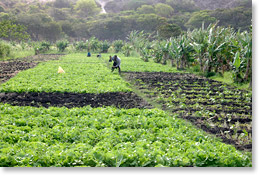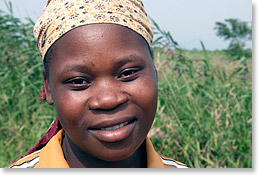|
Interview with Henry Saragih General Coordinator of La Via Campesina and Chairman of the Indonesian Peasant Union Not Wait for the Changing of Our Society Through the Government Matola, Mozambique
Henry Saragih: I’m Henry Saragih, chairman of the Indonesian Peasant Union and the General Coordinator of La Via Campesina for the period 2004-2008 (and now a new term). Also, for 2008, I was selected as the member of the International Coordinating Committee from the East Asia region. In Motion Magazine: Are you a farmer yourself? Henry Saragih: I come from north Sumatra, Indonesia, on the Sumatra island. I grow in the plantations area. My father worked for the plantation company and my mother worked as a farmer. Me, I have my farm in north Sumatra. Of course, because I travel a lot now, not just abroad but nationally, my farm is cultivated by my family. Every three months, two months, I go back to my farm to look in. I don’t grow rice, or vegetables, but I grow tropical fruit because I can harvest once per year. There’s no need to be on the farm every day. Also, I grow fish on my farm, in a fish pond. Before, we grew rice on our farm, but now fish because if we farm rice we must look after it every day. In Motion Magazine: What kind of fish? Henry Saragih: Goldfish and local fish. In Motion Magazine: What type of fruit? Henry Saragih: Tropical fruit, like rambutan, durian, mangosteen, Indonesian longan. We sell in the local market. In Motion Magazine: Do you sell as a family or as a cooperative? Henry Saragih: Now, we sell through the family. Just in the local market. In Motion Magazine: How many hectares do you have? Henry Saragih: Now, I have two hectares. In Motion Magazine: Can you talk a little about the SPI, its history, why it does what it does? Henry Saragih: I have been involved in the Indonesian movement since I was younger, 20 years ago, as a student and as one of the founders of the Indonesian Peasant Union. We started to help farmers when their land was taken over by plantation companies and by forest companies. There were many land disputes, conflicts. We supported them. We built small NGOs because at that time, during the Suharto era (Suharto was Indonesia’s president from 1967-1998), it was prohibited to build unions. In Motion Magazine: So, this was in the ’60s? Henry Saragih: Since 1965, in Indonesia, it was prohibited to create or build unions, except by the government. Because of that, we can say our movement was underground until 1998. We were working in the rural area from 1988 and, in 1992, we started to build the peasant movement, the peasant union, in north Sumatra -- in the local areas, in the district areas, in province areas. In Motion Magazine: How many peasants were involved? Henry Saragih: We organized thousands of peasants in the local areas, but not on a national level, rather on the province level, in north Sumatra, in central Java, and underground. We organized during that time, more or less, 400,000 farmers. In Motion Magazine: Farming families? Henry Saragih: Family farming. Then, after Suharto was brought down, in 1998, we set up the national organization, in the open. In 1996, we had joined with La Via Campesina, not at the national level, but the regional, provincial, district level, as members of La Via Campesina. Agrarian reform / sustainable agriculture In Motion Magazine: Why did you decide to join? Henry Saragih: As we know, La Via Campesina is struggling for agrarian reform, for sustainable agriculture. In Motion Magazine: Is agrarian reform particularly important in Indonesia? Henry Saragih: Yes. For Indonesia it is very important because since colonialization, and after Indonesia’s freedom in 1945 until now, the government has not yet implemented agrarian reform. Land still belongs to the company, to big companies. In Motion Magazine: Does your family rent? Henry Saragih: The majority of farmers, not my family because my father was successful in buying land, but the majority, 60 percent of the people living in the rural area, they don’t have land. They generally are farm workers or they rent the land. In Motion Magazine: Why is it important to have agrarian reform? Henry Saragih: Because how can we say we are farmers if we don’t have land? We can say that now the majority of people living in the rural areas in Indonesia are not farmers but workers. It is a very difficult livelihood in the rural areas if we don’t have land. In Motion Magazine: Do you see that as only an economic issue or is it a democratic issue as well? Henry Saragih: It is not just an issue of democracy but it is about power. Farmers, landless people, people in the rural area, don’t have power. In Motion Magazine: To run their community? Henry Saragih: Yes. How to distribute resources. Because resources are controlled by the company and some political elite. In Motion Magazine: What kind of resources? Henry Saragih: As you know, Indonesia is fertile land but now land still belongs to plantations, palm oil companies, or rubber, or corn nut, etc. And some of the land is used by the forest companies. Farmers, they don’t have access. There is very little access to the land. In Motion Magazine: Are these companies Indonesian or are they multinational? Henry Saragih: The majority are transnational. In Motion Magazine: Any particular companies? Henry Saragih: Goodyear (rubber) from the USA, and Sofindo (palm oil) of Belgium, London Sumatra (palm oil) from England. Many companies come from Singapore, Malaysia, Hong Kong. In Motion Magazine: Is there still a Dutch connection? (Indonesia was a Dutch colony for three and half centuries.) Henry Saragih: A little. But, now the situation is changing. Many companies are from Indonesia, although on the stock exchange the companies sell to the international market, like the Cargill group. They have access to our food. Global warming: export agriculture In Motion Magazine: One of the big issues that you are talking about here at this conference is global warming? Henry Saragih: As we know, there is global warming because many of our natural forests are changing -- to make plantations. And many of our natural forests are changing to make industrial timber. This has destroyed rivers, destroyed irrigation, and, of course, it is changing the climate because these plantations in the forest -- timber -- they are monoculture. Monoculture is destroying biodiversity in the forests. This product agriculture is not for our natural livelihood but for export, for example, palm oil, palm oil used as a bio-diesel. Also, using forests for timber, using paper for rayon, for the clothing industry, for pulp and paper. This is not normal for people’s consumption. Much consumption of paper is not for culture but for lifestyle. This is the situation. Now, in the name of climate change, they have decided they’d like to re-forest, to make new forests, but actually it is not true. They are making monoculture again. They are not making rainforest but monoculture. In Motion Magazine: What kind of trees? Henry Saragih: Eucalyptus, palm oil. We think they have destroyed our food system because people, they grow palm oil, they grow eucalyptus for export, and then they buy food. This is the situation. They let Indonesian farmers know we buy food from you (the USA). We buy soya beans, we buy maize, we buy milk, beef, and wheat. Five million tons every year is imported to Indonesia. In Motion Magazine: Is this changing your diet? Henry Saragih: Before, every day, we ate rice and cassava and many local foods. But now people are eating bread and noodles from the wheat imports. We are using a lot of oil to transport food from the USA to Indonesia and from Indonesia we export to other countries. If we were building economic food sovereignty, or sustainable agriculture, Indonesia wouldn’t need to import food. We would not use so much oil or gas for transportation of food and we would not destroy the forest. In Motion Magazine: So there’s a relationship between food sovereignty and global warming? Henry Saragih: Yes. I say this because when the principle of food sovereignty is not implemented we are increasing global warming because we need transportation, packaging, packaging using pulp and paper. We see, every day, people using paper to pack food. But, we don’t actually need to import paper from the USA. We have paper in our country. We don’t need to import milk because we can produce milk in our country. Rather, we are destroying our forests to plant palm oil, rubber, cacao, etc., for export. And, at the same time, we import food. The Letter of Intent to the IMF In Motion Magazine: When did these changes start? Henry Saragih: It started rapidly in 1970. In Motion Magazine: Would you say this was a form of the Green Revolution? Henry Saragih: The Green Revolution and now, more massively, with the neoliberal policies of the WTO (World Trade Organization) since ’98, after the Indonesian financial crisis and Indonesia signed the Letter of Intent with the IMF (International Monetary Fund). Under the conditions of the Letter of Intent, Indonesians must open local markets for food, with no restrictions or regulations on taxing imports, like soya, etc. And no subsidies to the farmers. There was liberalization of the market and privatization of natural resources like water, land. In Motion Magazine: What happened as a result of these policies? Henry Saragih: After these policies, our soya beans farmers could not compete with the imported soya beans. Our milk production cannot compete with imported milk. Fruit, we cannot compete. And, at the same time, the irrigation system wasn’t good because the government would not give project subsidies to building irrigation. Also the government had a system to buy food from the farmers and then sell them again when the price was high -- this ended with privatization. Day to day, the land concentration belongs to the transnational corporations, and the political elite, and the traders. They lost their land. They lost their control. Now, actually, agriculture is directly controlled by business and the big companies. It does not belong to the small farmers or the family farms. In Motion Magazine: What percentage of the population are family farmers? Henry Saragih: In Indonesia we have 25 million small farmers. In Motion Magazine: And the population of the country? Henry Saragih: 220 million now. As I said, 60% in Indonesia depend on agriculture. The number in poverty is increasing now in Indonesia, compared with 15 years ago. The number in poverty on the Indonesian statistics web site is 15 percent in poverty. But the World Bank site says 50%. In Motion Magazine: How is poverty defined? A dollar a day? Henry Saragih: With the standard dollar. In Motion Magazine: How can Via Campesina fight that? Henry Saragih: We strengthen the farmers. Direct action, take over the land. We fight with the company to take over the land, to distribute it to the farmers. We can say now we have success with direct action, opening the land. In Motion Magazine: How much land? Henry Saragih: 100,000 hectares. We have success. In this period, from 2007 until 2012, our organization, we have a target of 200,000, which we will distribute to the farmers. In Motion Magazine: Do you distribute directly to families or to groups of families? Henry Saragih: To groups of families. In Motion Magazine: Cooperatives? Henry Saragih: In some areas, cooperatives (the majority). In Motion Magazine: How do the cooperatives work? Henry Saragih: Well, we have started and in some places we have success, in others not yet. It is our internal homework now -- how to continue to improve our education system, our cooperative system, our sustainable agriculture system, because the majority in the rural area now have the monoculture system. Farmers, they do not know now how to build sustainable agriculture. In Motion Magazine: The sustainable agriculture that you use. Are those traditional methods? Henry Saragih: Not traditional, but agroecological. In Motion Magazine: How do you define agroecology? Henry Saragih: Of course, building from our heritage, our old system, combined with new information. Through Via Campesina we have exchange programs with Thailand, with Japan. From that we have new methods for making compost, reusing local seed, using local material to make the soil fertile. In Motion Magazine: Do you think that there is an aspect of agroecology which is based on the democratic participation of the people that you are working with? Henry Saragih: I think when we train in agroecology it is more implementing our principle of food sovereignty. How to save our livelihoods, to not destroy the land, not using fossil fuels, not using oil. If we use agroecology, we use less energy. We can use local energy like manure from cows, from animals. I think, at the base, on the local level, we are building a democratic system. We are building consensus. We are building participation. We are building our agriculture. In Motion Magazine: And this is community by community? Henry Saragih: Yes, yes. In Motion Magazine: How many are in a community? Henry Saragih: A minimum is 25 families. If they have more it is OK. In Motion Magazine: And maximum? Henry Saragih: We are not making a maximum. But when they are bigger, they divide the group. In Motion Magazine: How does the government respond to you taking over land? Henry Saragih: Well, every day, we are fighting with the police and the security of the company. Many of our farmers are in jail. None of our members, but some have died from shooting by the police. For our members, no, because we have tactics and the police, generally, when they know it is our organization, they are more careful. But they bring many of our members to jail because we protest, because we are fighting with them. In Motion Magazine: So, it is not yet resolved? Henry Saragih: Not yet resolved. But I think it is evident for us how difficult it is, and also how important for the government to make changes in the regulations. In Motion Magazine: Do you think that is going to happen? Henry Saragih: I think we are, more and more, stronger. It can happen. Actually, after we began to resist, there was a reaction (by) them to our struggling. They produced many regulations on water, plantations, investment regulations. They know that our movement has grown. In Motion Magazine: Would you say that the kind of community structures that you are building are similar to those of Gandhi or the Zapatistas who have said, “Just do it now rather than wait for some other change. What we are doing now is proving that it can be done and we are not going to wait around”? Henry Saragih: We believe we must build our society, our culture. We must be strong, as social movements, and not wait for the changing of our society through the government. We must fight In Motion Magazine: And this is predominantly in northern Sumatra, or throughout Indonesia? Henry Saragih: Now we are in Sumatra and Java and Flores. But not yet all Indonesia. Next year we will be working in Borneo, in the Celebes Island, and in Balboa. Especially Kalimantan (the Indonesian portion of Borneo). In Motion Magazine: As the General Coordinator of Via Campesina, how do you assess Via Campesina? How is it doing? What needs to be done? Henry Saragih: I think Via Campesina we must continue with our struggle, our friendship because day-to-day we see how the role of Via Campesina is important. For us, day to day, it is more clear, our friendship. Our struggle is clear against neoliberal policy, against the neoliberal system. We must build our society. We have had success in limiting the WTO, the World Bank and IMF, especially the WTO. We have had success. We have spread the alternative, to build a special agriculture, and put out the word of food sovereignty and agrarian reform. Before, agrarian reform was not on the agenda in the FAO (the U.N.’s Food and Agriculture Organization), not on the agenda of the national governments, but now, after Via Campesina struggling, now agrarian reform has an agenda in the FAO and in some governments. The same with food sovereignty. We see in the food crisis and the financial crisis, many of the governments are looking back, changing their concept of food. They now adopt the concept of food sovereignty from Via Campesina. It is time for us to strengthen our movements and to work with some governments, who are close to our concepts. In Motion Magazine: How do you strengthen the movement? Henry Saragih: By building our capacity, training, and then building our organization in many places. For example now we are in Africa. Before we were just in one region, now we have two regions in Africa. We think next year maybe we can have three regions. We believe that through our intensive meetings, intensive communications, we will spread our struggling, our policy, to the national organizations, and from the national organization to their bases. They will adopt our concept of struggle/friendship in their training, in their day-to-day action. Thematic action and education. For example, our members, in their action against the GMO, they continue struggling for agrarian reform, land reform, against the liberalization of the market, against the WTO. And they organize training, they organize communication within their organization. They are building cooperatives. They are building alternatives. They are building the alliance. We must change our imagination, our picture for our world In Motion Magazine: Neoliberalism is the latest version of capitalism, with no regulations at all. Would you say Via Campesina is anti-capitalist? Henry Saragih: We can say Via Campesina is anti-neoliberal and of course anti-capitalist, too. We must build another system, not this system because we have seen the fruit of capitalism, neoliberalism, as making an unjust society. From our many experiences, we believe we can build another system. In Motion Magazine: What are the aspects of this other system? One would be cooperatives? Henry Saragih: Cooperatives; building a new culture that is not exploitative, is not based on over-consumption; and is more friendly to improvement. We must continue emancipation and equality and looking out for other people. We must get out of the idea of exploitation, making people celebrity. We can have independence. We believe European people can have a better life without exploiting people in Asia. Life can be good without the exploitation of other people. In Motion Magazine: And the base for that would stay in the communities? Or would that rise to a national level? Henry Saragih: I think that it is in the principle of solidarity, not just on the base of the economy. In Motion Magazine: So, there would be laws that combine the solidarity approach with an economic approach? Whereas now it is only economic ... Henry Saragih: Economic, and exploitation, and oppression, and domination. Not thinking of equality and solidarity. People just talking about competition. The principle of neoliberalism is competition. I think we must change the imagination, our picture for our world. It can be built back, for food, because food is basic for the people. Exploitation of food, resources of the land In Motion Magazine: What is the relationship between food and democracy? Henry Saragih: If you look at colonialization, from Europe to my country, Indonesia, it is exploitation of food. They are changing our agriculture from local to export-to-Europe. They export tobacco, coffee, tea, pepper. This is the history of colonialization. After that -- the oil. And then, they send technology, like the car, etc. But, first, in history, they take from our land. In Motion Magazine: That is why Via Campesina is important, because it relates specifically to food? Henry Saragih: Yes. Food and raw materials. Via Campesina, we relate to food and raw materials, forests, wood, etc. And Via Campesina, why it is important -- if you exploit mining it is under the land, and it is to expel the people there. If you are talking about a mining company coming from the USA to Indonesia, you are talking about Via Campesina, talking of the farmers, because this company comes from another country to exploit the land. They expel the indigenous people. Expel the people living in the river area, in the mountains. It is why you see campesinos in Latin America, like in Bolivia, link with us because of the relationship with agriculture, the relationship with mining, gas, etc. It is the using of the resources of the land. In Motion Magazine: In Indonesia, are there different cultures, or just one culture? Henry Saragih: Great diversity. Indonesia is very diverse in language, and ethnically, thousands of ethnic groups, and languages too. In Motion Magazine: How does that play into the movement? Henry Saragih: We must continue to strengthen as social movements and of course build the alliance with outside farmers and work with the governments who are close to our struggle. In Motion Magazine: Is there strength in that diversity? Henry Saragih: Yes. I think there is strength in diversity and the friendship in building our equality, our global justice, building how to save our planet. We see today people destroying our lives. Like here in Mozambique, they would like to change a million hectares of land, here, to grow material for bio-fuels. This is a problem for the environment, for the food system here. We don’t believe they do this to make their people rich, for their prosperity. If we look at Indonesia, Brazil, they are making more slavery. Now is the time for us, with the neoliberal crisis, to continue to strengthen our movements. It is an opportunity for us. Published in In Motion Magazine April 14, 2009 Also see:
|
||||||||||||||||||||||||||||
If you have any thoughts on this or would like to contribute to an ongoing discussion in the  What is New? || Affirmative Action || Art Changes || Autonomy: Chiapas - California || Community Images || Education Rights || E-mail, Opinions and Discussion || En español || Essays from Ireland || Global Eyes || Healthcare || Human Rights/Civil Rights || Piri Thomas || Photo of the Week || QA: Interviews || Region || Rural America || Search || Donate || To be notified of new articles || Survey || In Motion Magazine's Store || In Motion Magazine Staff || In Unity Book of Photos || Links Around The World NPC Productions Copyright © 1995-2018 NPC Productions as a compilation. All Rights Reserved. |


